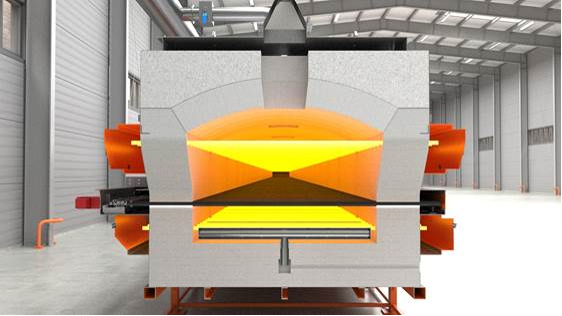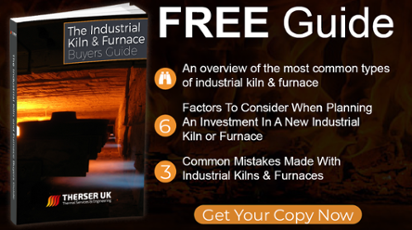Share this
How Does an Industrial Kiln Work?
by Therser Sales Team on 13-Dec-2022 11:58:49

Kiln technology originated in ancient times, and its development from earthen trenches filled with fuel and items to be fired, up until the present day, happened in stages over thousands of years. The first kilns were recorded in use around 6000 BC, but it was the Chinese who appear to have been the furthest ahead in their technologies, and had developed kilns capable of firing at 1000 °C before the year 2000 BC.
A modern day kiln is basically a type of oven with a thermally insulated chamber which is used to produce temperatures high enough to complete many processes, including drying, hardening, and other chemical processes, with a myriad of uses in modern day industry, including:
- Fusing and deforming glass
- Tobacco, hops, and grains
- Firing ceramics and bricks to harden
- Melting metal
- Smelting ore
- Pyrolysis of chemicals
- Heating gypsum to make Plaster of Paris
- Cremation
There are basically just two types of kiln: Continuous, or Tunnel Kilns, and Intermittent Kilns. Both are made up of an insulated box with the ability to have the inner atmosphere and temperature controlled and elevated to produce enormous heat.
The Continuous Kiln
Also called a Tunnel Kiln, as it is designed to have the contents to be modified passed through it slowly, or in some cases, pass the heat source slowly over the contents. It is a long structure, rather than round or box-like, and only the central portion is heated, so that items enter at room temperature at one end, pass through the heat source, then slowly cool again as they pass towards the other end, exiting back at room temperature.
The Continuous Kiln is designed to be energy efficient as not only is the heat given off during the cooling process is recycled to the beginning to begin the heating process by pre-heating the items before they enter the kiln proper, but also they are never allowed to cool, loading and removing products continuously, so they are never reheated from cold.
There are a number of different types of continuous kilns available in the market. Our Continuous Kilns, for instance, include four types: Tunnel, Roller, Belt, and Batt.
These kilns all work well with automated systems, making production runs less labour intensive, and more cost effective, and are therefore ideal for large volumes.
The Intermittent Kiln
Also known as a Batch Kiln, the Intermittent Kiln is designed to be closed, with the product inside it, and has a scheduled heating and cooling process. It will process batches consisting of different shapes and sizes and is shut down between batches, making it ideal for small production volumes.
In the UK these kiln types are mainly: Fixed Hearth, Shuttle, Top Hat, Up Draught, and Down Draught; all of which are manufactured by our team at Therser. Modern day Bespoke Kilns can be any of the ranges available, customised to the client’s industrial needs.
Bespoke Kilns
Our design engineers work with you to create a bespoke kiln that precisely fits your needs and business goals. We make sure we understand your products, industry, production targets, and required volumes.
Our kilns are flexible, efficient, and use the best of modern technology in the areas of:
- Energy efficiency
- Clean air
- Heat reclaiming
- Automation
- Reduced costs
- Reduced wastage
- Shorter firing cycles
- Commissioning & Support Services
Our support team are always keen to answer your questions, provide advice, and ongoing maintenance once you are up and running.
Call Now
Please speak to one of our engineers by calling +44 (0) 1782 824453. You can also contact our technical sales team by email on sales@therseruk.com. For more information, take a look at our free Buyer’s Guide To Industrial Kilns, which can be downloaded by clicking here.
Share this
- Company News (90)
- Battery Materials (41)
- kiln (37)
- fabrication (29)
- Alloy (27)
- Furnace (27)
- Welding (16)
- Industrial Kilns (15)
- Battery (13)
- Ceramic Kilns (13)
- Processes (13)
- alloy fabrication (13)
- Shuttle Kilns (12)
- RTO’s (11)
- Vacancies (11)
- Hydrogen (10)
- Therser UK (9)
- Tunnel Kiln (9)
- Refractory (8)
- Therser (8)
- Wellman Furnaces (8)
- Brickwork (7)
- Case Studies (7)
- Afterburners (6)
- Fibre Lining (6)
- electric (6)
- Almor Wellman (5)
- thermal engineers (5)
- Biochar (4)
- Exhibition (4)
- Pyrolysis (4)
- Servicing (4)
- Spares (4)
- heat treatment (4)
- History (3)
- Ceramics Uk (2)
- Combustion Control Upgrades (2)
- Nitrogen (2)
- Temperature Control Rings (2)
- gas (2)
- Certificates (1)
- Instrumentation (1)
- MMC (1)
- RHK (1)
- Roller Hearth Kiln (1)
- Test Trials (1)
- aerospace (1)
- analyser (1)
- elec (1)
- oxygen (1)
- vans (1)
- September 2025 (2)
- May 2025 (2)
- March 2025 (1)
- February 2025 (2)
- January 2025 (5)
- December 2024 (5)
- November 2024 (7)
- October 2024 (5)
- September 2024 (4)
- August 2024 (14)
- July 2024 (13)
- June 2024 (2)
- May 2024 (5)
- April 2024 (13)
- March 2024 (8)
- February 2024 (12)
- January 2024 (14)
- December 2023 (6)
- November 2023 (12)
- October 2023 (24)
- September 2023 (11)
- August 2023 (11)
- July 2023 (9)
- June 2023 (15)
- May 2023 (53)
- April 2023 (5)
- March 2023 (6)
- February 2023 (7)
- January 2023 (3)
- December 2022 (8)
- November 2022 (5)
- October 2022 (11)
- September 2022 (1)
- August 2022 (2)
- July 2022 (1)
- June 2022 (2)
- May 2022 (1)
- March 2022 (1)
- February 2022 (1)
- January 2022 (1)
- December 2021 (3)
- October 2021 (1)
- August 2021 (1)
- June 2021 (1)
- May 2021 (4)
- April 2021 (2)
- March 2021 (4)
- February 2021 (2)
- December 2020 (3)
- November 2020 (1)
- September 2020 (3)
- May 2020 (1)
- April 2020 (2)
- March 2020 (1)
- January 2020 (1)
- December 2019 (1)
- July 2019 (2)
- June 2019 (1)
- April 2019 (2)
- March 2019 (3)
- February 2019 (4)
- December 2018 (1)
- November 2018 (1)
- September 2018 (2)
- August 2018 (1)
- July 2018 (1)
- May 2018 (3)
- April 2018 (1)
- February 2018 (3)
- January 2018 (2)
- December 2017 (3)
- November 2017 (1)
- October 2017 (2)
- September 2017 (4)
- August 2017 (1)
- July 2017 (2)
- June 2017 (2)
- May 2017 (3)
- April 2017 (3)



